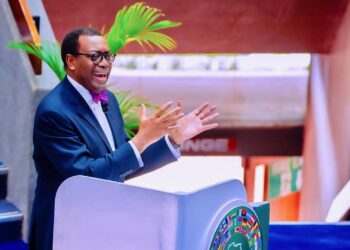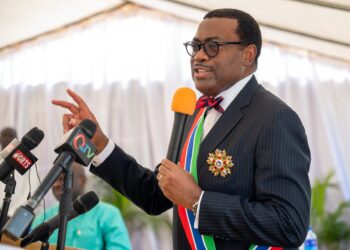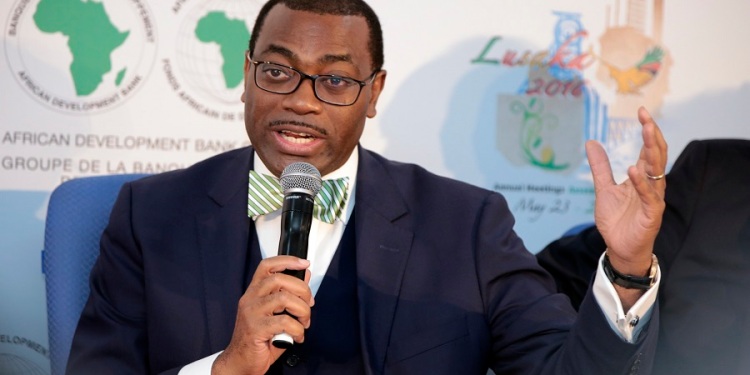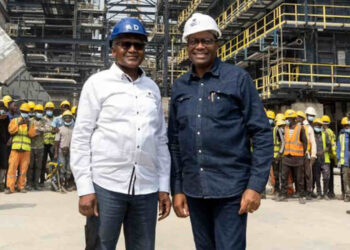In August 2020, history was made in the African Development Bank. For the first time since 1964, a single candidate got 100% votes of shareholders, regionals and non-regionals to be re-elected, President. That record-breaker was Nigeria’s Akinwumi Adesina.
Within four and a half decades, Adesina has gone from being the student whose ‘math was poor’ to becoming a globally acclaimed development economist with an extra feather to his cap – the Outstanding Black Agricultural Economist Award by the American Association of Agricultural Economists.
The renowned economist who often spots an elegant bow-tie was born to a Nigerian farmer in Ibadan, Oyo State. He had his primary and secondary education in his village before attending the University of Ife (now Obafemi Awolowo University, Ile-Ife), Nigeria to bag a Bachelors in Agricultural Economics with First Class Honors in 1981, the first student to be awarded this distinction by the university.
Forbes records that Adeshina was once told by a scholar in his university that he could never get into Purdue University, Indiana, to further his education as his “math was poor” but Adeshina was undeterred.
He pressed on and got admitted into Purdue University, where he not only got his Masters (1985) and PhD in Agricultural Economics (1988) but also won the Outstanding PhD Thesis for his research work.
Out of the lecture hall
Right after obtaining his Doctoral degree, Adesina won the prestigious Social Science Fellowship from the Rockefeller Foundation in 1988 and started his career working with the Foundation as a senior scientist in the same year.
He served as Assistant Principal Economist at the International Crops Research Institute for the Semi-Arid Tropics from 1988-1990; as the Principal Economist at the West Africa Rice Development Association in Bouaké, Ivory Coast from 1990 – 1995; and as Senior Economist and Social Science Coordinator at the International Institute of Tropical Agriculture 1995-1998.
He became the representative of the Rockefeller Foundation for the Southern African area from 1999 to 2003, and then an Associate Director for food security till 2008. He joined the Alliance for a Green Revolution in Africa (AGRA) in 2008 as the Vice President (Policy and Partnerships), leading several initiatives that leveraged over $4 billion in bank finance commitments to Africa’s agriculture sector.
In 2010, Adesina was appointed by UN Secretary-General Ban Ki-moon as one of 17 global leaders to spearhead the Millennium Development Goals. In September 2016 again, Ki-moon appointed Adesina to serve as a member of the Lead Group of the Scaling Up Nutrition Movement.
He became Nigeria’s Agriculture Minister in 2010 until 2015 when he was elected the presumptive President of the African Development Bank by the Bank’s Board of Governors at its Annual Meeting held in Abidjan, Côte d’Ivoire.
As Minister of Agriculture, Adesina is credited with introducing an innovative electronic wallet system, to provide farmers with subsidised farm inputs at scale using their mobile phones. This electronic wallet system reached 15 million farmers in 4 years and has gone on to be implemented in several other African countries including Afghanistan.
He led financing initiatives to support youth engagement in agriculture and Small and Medium Enterprises (SMEs), and successfully attracted private sector investments in Agriculture in excess of $5.6 billion. It was a rosy time for Nigerian farmers as food production expanded by an additional 21 million metric tonnes.
Akinwumi Adesina left all this for his next challenge when he resumed at the AfDB on September 1, 2015, as the first Nigerian to head the development bank.
On October 31, 2019, Dr Adesina led the African Development Bank to achieve the highest capital increase since the Bank’s establishment in 1964, when shareholders raised the general capital of the bank by 125%. This increased the bank’s capital by $115 billion, from $93 billion to $208 billion, a historic achievement for Africa.
On December 6, 2019, Dr Adesina was named the African of the Year by the All Africa Business Leaders Awards (AABLA™) in recognition of his innovative contributions to the Africa Investment Forum, which opened up the continent to billions of dollars in investment.
On August 27, 2020, after a fairly difficult year fending off corruption allegations, Adesina was unanimously reelected into the position of AfDB President.
Recognitions
Adesina has received several awards and recognitions which continue to affirm him as a development economist worth his salt. While he was still Minister of Agriculture, in 2013, Forbes also named him the African Man of the Year for his reform of the Nigerian agriculture system and for introducing more transparency into the fertiliser supply chain, a system which had been severely beset with corruption for years. He was the first public sector Minister in Africa to win the award.
In recognition of his dedication to accelerating development in Africa, he was awarded the highest national honours of Senegal, Cameroon, Madagascar, Togo, Liberia, Niger, and Tunisia respectively; and the second-highest national honour in Nigeria, the Commander of the Order of the Niger.
Akinwumi Adesina has also received what is generally known as the “Nobel Prize for Agriculture,” from the World Food Prize Foundation in October 2017.
The New African Magazine in 2015 also cited him as one of the Top 100 most influential Africans and in October 2019, Dr Adesina was awarded the Emeka Anyaoku Lifetime Achievement Award of Outstanding International Icon by the Hallmarks of Labour Foundation.
Adesina is also the recipient of several Honorary Doctorate degrees across Nigeria and the USA. Some of them include Franklin and Marshall College, USA; Purdue University, USA; Afe Babalola University; Federal University of Agriculture, Abeokuta; Adekunle Ajasin University, Nigeria; Federal University of Technology, Akure, Nigeria; Michigan State University, USA; National Defence Academy, Nigeria; and the University of Alberta, Canada.
In April 2019, leading reputation management firm, Reputation Poll International, listed Dr Adesina among the 100 most reputable people in the world. On 29th February 2020, he was also named African of the Year 2019 by the African Leadership Magazine, after receiving 60% of the votes cast by one million readers of the magazine.
It was because of these numerous recognitions that a cloud of dust was raised when corruption allegations were made against Adeshina as he wrapped up his first tenure as AfDB president.
Corruption allegation scandal
In January 2020, corruption allegations were brought against Akinwumi Adesina. According to the whistleblowers, the AfDB president had been giving contracts to friends and appointing relatives at the bank.
Adesina described the allegations as attempts to tarnish his reputation and after an internal review by an independent panel, he was cleared of all corruption charges in April.
Being one of the AfDB’s biggest shareholders, the United States decided it was not satisfied with the internal review by the Bank’s ethics committee, and through US Treasury Secretary, Steven Mnuchin, they insisted on a new inquiry. The insistence to probe further continued to hang like a dark cloud over Adesina in the buildup to the August 2020 elections where he was to be reelected for another 5-year term.
A panel of three experts was reinstituted to probe further, made up of Ireland’s ex-President Mary Robinson, Gambian Chief Justice Hassan Jallow and Leonard McCarthy, former World Bank Integrity vice-president. Their findings were no different.
“The panel concurs with the committee in its findings in respect of all the allegations against the president and finds that they were properly considered and dismissed by the committee,” their report concluded.
The final check given to him not only upheld all his past recognitions as a person of integrity but also paved the way for the 60-years old Adesina to stand as sole candidate in the election.





















